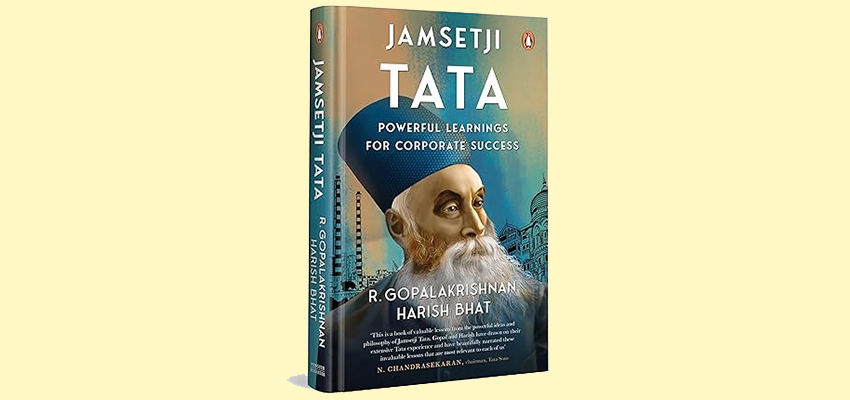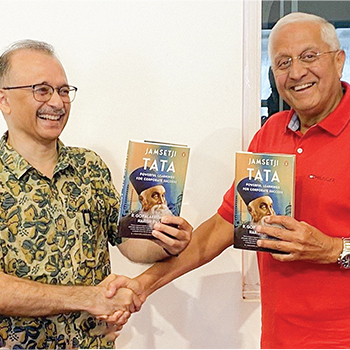Learnings from the Renaissance Man

Jamsetji Tata: Powerful Learnings for Corporate Success by R. Gopalakrishnan and Harish Bhat, is a treasure trove of valuable lessons from the powerful ideas and philosophy of Jamsetji Tata, the father of modern Indian industry. It helps that the authors—both bigwigs from the House of Tata in their own right—have drawn on their extensive Tata experience to bring the great man’s learnings to life
First things first. “Upon seeing the title of our new book, the reader would legitimately wonder why there is yet another book on the founder of the Tata Group. The life of the founder, Jamsetji, as well as the history of the enterprise have both been subjects of many scholarly and journalistic works. So we owe the reader an explanation for yet another book. In essence, this is not a biography of Jamsetji Tata. It is about how he managed to integrate into one whole his philosophy, his principles, his quality of persistence and his eye for what brought profits,” write the authors.
With that clarification out of the way, we can get to why this is a book you ought to be reading.
Lets’ look at the backdrop that prompted the book. Enterprise and management in India are about to move from adolescence to young adulthood. As India integrates into global trade and liberalises the national economy, the upcoming 25 years may well turn out to be a defining period in shaping the future relations between business and society in the country. The practice of management needs to win the support of society; business must be perceived as responsible contributor to the ecosystem. Only then can it play its true role in the national economy. In view of this, the principles by which Jamsetji Tata set up his House of Tata in the latter half of the 19th century are relevant and worthwhile to recount, albeit in the modern context.
During the 1800s and early 1900s, India produced some remarkable leaders who shaped the idea of India as a nation: Dadabhai Naoroji and Mahatma Gandhi in public life, Rabindranath Tagore and C.V. Raman as intellectuals, and Jyotiba Phule and B.R. Ambedkar as social activists. When it comes to industry and enterprise, the name of Jamsetji Tata stands out. Born in 1839, he started his partnership firm Tata and Sons in 1868. The company, Tata Sons Ltd, was incorporated in 1917 and took over the business of Tata and Sons. Today, more than 150 years later, this business that is now broadly referred to as the Tata Group, continues to grow and flourish.
The thought leadership of Jamsetji and his successors has stood the test of time and has proven its enduring quality all through these years of industrial and economic development in India.
What’s more, it’s options and strategies are steeped in humane values.
While business and entrepreneurship are recognised globally as important engines of growth, it is equally true that society is suspicious of business given the greed and excesses it is associated with. Hence, the relevance of Jamsetji Tata’s thought leadership.
The CC Review

Lucid, rich with anecdotes and simple to read, the book is a must-read, for it reveals the enduring success of TATA for so many years. It showcases how profit and social responsibility can align, how a businessperson can also be a social engineer. As Jamsetji Tata said: “In a free enterprise, the community is not just another stakeholder in the business, but is in fact, the very purpose of its existence.”
Take for instance, the story of Sumant Moolgaokar, the iconic MD of the then TELCO group (now Tata Motors.) As it goes, in the 1960s, TELCO had decided to create a second manufacturing plant to add to its original plant located in Jamshedpur. Pune was chosen as the location of this new plant—over 800 acres of barren and rocky land were acquired for this project. Moolgaokar was of the view that the unit should give back to nature and not merely take from it. To that end, he had the factory designed in such a way that there were large open spaces left all along the roads and the production units. He planted over 2.5 lakh trees within the factory campus so that the complex looked more like a tree park than a factory site.
To ensure this was carried out to perfection, he brought to the job, the noted horticulturist MD Sharma, in addition to his engineers. Since all these trees would require water, he decided to create an artificial lake that could store and provide water throughout the year. He also envisioned a water-bird sanctuary for migratory birds at this lake, by planting a forest all around. Oh, he had his critics who wondered why Moolgaokar was spending so much money and time on this, but he stuck to his guns.
Today, this is regarded as the best bird sanctuary in the Pune region for thousands of migratory water birds. In one stroke, Moolgaokar showed how business and environmental welfare could combine. As JRD Tata once said about this initiative: “We did not have to create a lake and plant trees to produce a truck. But we did. What I am most proud about is not the making of steel or trucks, but our social concern.
This, and many other instances of Tata men who made a difference, is what makes the book so enthralling. While you are at it, don’t miss out on “A pilot turns Pioneer—the Making of an Airline”-which is the story of how JRD Tata built Air India.
The book’s table of contents is assembled under ten P’s namely: Philosophy, Purpose, Progress, People, Pioneering, Persistence, Principles, Profit, Perspectives and Post script. Almost each chapter contains a lead essay and three stories that exemplify the theme of that chapter. The three stories are drawn from the Tata Group’s early days, middle period and contemporary period—illustrating how each theme was carried through generations.
As the old and the wise say, "Here’s to the enduring power of the larger good".
ABOUT THE AUTHORS
Harish Bhat has held several senior roles in the Tata Group over the past 30 years, including managing director of Tata Global Beverages and chief operating officer of the watches and jewellery businesses of the Titan Company Ltd. An avid marketer, he has helped create many successful Tata brands.
Ramabadran Gopalakrishnan is an Indian businessman and author. Until his retirement he was an executive director of Tata Sons Ltd and served on the boards of Tata Power, Tata Technologies, AkzoNobel India, Castrol India and ABP Pvt. Ltd.